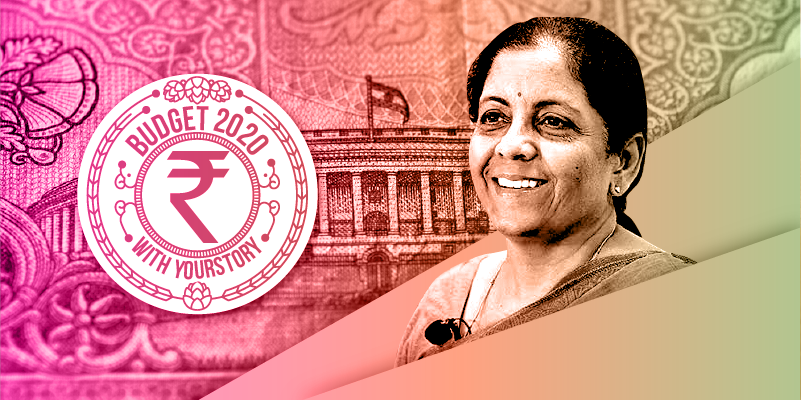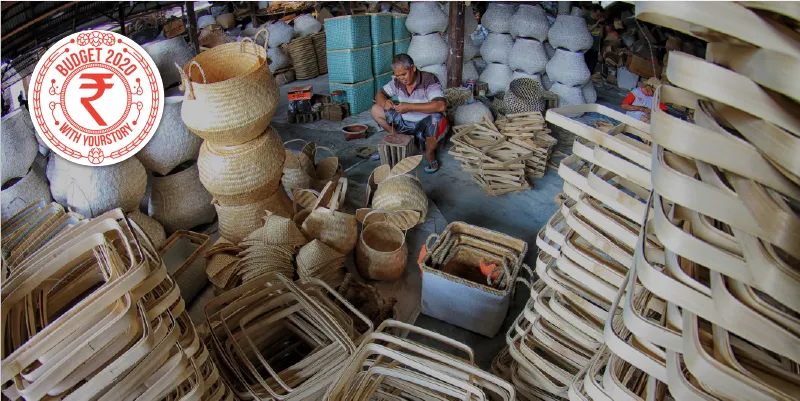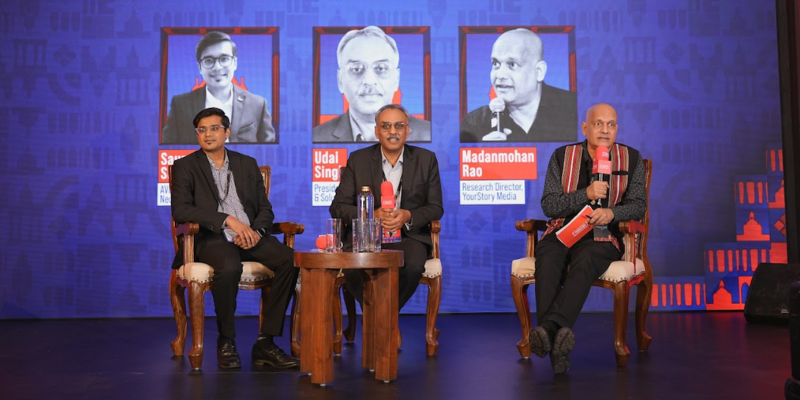Budget 2020: FM allocates Rs 900 Cr debt-funding for MSMEs, audit threshold increases from Rs 1 Cr to Rs 5 Cr
The Union Budget 2020 was presented today by Finance Minister Nirmala Sitharaman. She announced a range of schemes for MSMEs and small business saying that the sector is pivotal in keeping the wheels of our economy moving.
Rishabh Mansur

Saturday February 01, 2020 , 7 min Read
Finance Minister Nirmala Sitharaman today presented the Union Budget 2020 in Parliament and announced a range of schemes and measures for micro, small, and medium enterprises (MSMEs) and small businesses.
Key highlights of the Budget 2020 for MSMEs
- Uplift the manufacturing sector
- National logistics policy to be released
- Scheme to provide higher insurance cover for exports
- Nirvik scheme for export tax disbursement
- Scheme to provide subordinate debt to MSME entrepreneurs
- App-based invoice financing loans product to be launched
- Rs 2.83 lakh crores allocated for agro and allied sectors
Budget 2020 proposes to boost the manufacturing of mobile phones, electronic equipment, and semiconductor packaging. The Finance Minister said this could also be used to uplift medical devices manufacturing.

In January 2020, Union MSME minister Nitin Gadkari had said his department plans to set up five parks to manufacture low-cost medical devices in the country.
A National Technical Textiles Mission is also announced in the Budget 2020, which will have a four-year implementation period and an outlay of Rs 1,480 crore. Sitharaman said a National Logistics Policy will also be released to create a single window e-logistics market and make MSMEs competent.
Sitharaman said, to achieve higher export credit, a new scheme is being launched to provide higher insurance cover and reduce the premium for small exporters. It will also simplify the procedure for claim settlements.
The finance minister then stressed on the aspiration to make every district an export hub. In keeping with this, she announced the Nirvik scheme for export tax disbursement, which aims to make loans easier to access for exporters and also simplify the lending process.
Announced by Commerce Minister Piyush Goyal in September 2019, Nirvik is a New Export Credit Insurance Scheme (ECIS) by Export Credit Guarantee Corporation of India (ECGC).
The ECGC provides credit guarantee of up to 60 percent loss, but under Nirvik, the insurance cover guaranteed will cover up to 90 percent of the principal and interest of loans and will include both pre and post-shipment credit.
The Minister mentioned creating a unified procurement system on public procurement portal Government e-Marketplace.
“This will create a great opportunity for MSMEs. There are 3.24 lakh vendors already on the GeM platform and we are targetting Rs 3 lakh crore turnover,” she said.
The announcement is not entirely new as the Commerce Ministry launched GeM in August 2016 with the objective of creating an open and transparent procurement platform for the government.
Last year in September, it was reported that GeM is working on a series of steps including a mechanism for timely payment to registered small businesses and MSMEs, and rating buyers and sellers to promote its growth.
In the Budget 2020, Sitharaman said a digital platform will be set up for seamless application and capture of Intellectual Property Rights (IPR).
However, it was not clear whether she was referring to the website and mobile application Learn to Protect, Secure and Maximise Your Innovation on Intellectual Property Rights (IPRs) launched in October 2019.

The website and app have been developed by Cell for IPR Promotion and Management (CIPAM)-DPIIT in collaboration with Qualcomm and National Law University (NLU), Delhi.
Debt funding and GST
In her speech, Sitharaman then announced a scheme to subordinate debt to MSMEs. She asked banks to extend restructuring MSME NPAs for one more year, which had a deadline of March 2020.
“Over five lakh MSMEs have benefitted from debt restructuring,” she said adding the MSME sector will be allocated with Rs 900 Cr debt-funding.
Further, she said an app-based invoice financing loans product will be launched to alleviate the problem of delayed payments and cash flow mismatches for MSMEs. She also said amendments will be made to enable NBFCs to extend invoice financing to MSMEs.
In January 2019, the Reserve Bank of India (RBI) had allowed the recasting of loans to MSMEs under the condition that the total fund and non-fund based exposure to the MSME borrowers does not exceed Rs 25 crore.
In her speech, Sitharman also said implementation of GST had benefitted MSMEs. However, leading up to Budget 2020, MSMEs were not too happy with GST and did not shy away from voicing their expectations in relation to GST.
The rationalisation of GST was the top issue for the MSME sector, a segment that forms the backbone of the Indian economy and contributes 29 percent of the country’s GDP.
MSMEs expected the Union Budget 2020 to address the rationalising of GST slabs, improving the GST refunds system, and addressing export problems caused due to GST.
In Budget 2020, Sitharaman allocated Rs 2.83 lakh crores for agro and allied sectors including irrigation, rural development, and Panchayati Raj. The Agri credit target has been proposed at Rs 15 lakh crore.
The budget also proposed comprehensive measures for water-stressed districts. Around 35 lakh farmers will be helped for setting up stand-alone solar pumps to make a living even out of barren lands. The budget also focused on providing 152 million metric tonnes of warehousing facilities.
Last year's MSME scenario
On January 31, Nirmala Sitharaman presented tabled economic survey 2019-20 in the parliament. The survey stated the detailed analysis of the measures undertaken to bolster the MSMEs in India.
- The Minister said 1,59,422 loans involving Rs 49, 330 crore have been sanctioned under the 'PSB Loans in 59 in Minutes' scheme. Out of this, Rs 37,106 crore has been disbursed till October 2019.
- The survey lays down the interest subvention of 2 per cent for all GST registered MSMEs on incremental credit up to Rs 1 crore. According to the survey, SIIDBI has received and settled the claim of Rs 18 crore from 43 banks and NBFCs from November 2018 to March 2019.
- All companies with a turnover more than Rs.500 crore to be mandatorily on TReDS platform (online electronic institutional mechanism for facilitating the financing of trade receivables of MSMEs through multiple financiers) to enable entrepreneurs to access credit from banks and the survey states that so far 329 companies have been registered on TreDS and there are 1500 non-compliant companies which are yet to be registered.
- The Survey states that 57,351 MSME sellers and service providers are registered on GeM portal ( the Government e-Marketplace is a government-run ecommerce portal to facilitate and enable online procurement of goods and services needed by various government departments, organisations and PSUs.) Further, 50.30 percent of orders value on GeM portal is from MSEs.
- All Central Public Sector Undertakings (CPSUs) are to compulsorily procure at least 25 per cent of their total purchases from MSMEs. CPSUs till now have procured goods and services worth Rs 15,936.39 crore from 59,903 MSMEs and only 0.43 percent of the total procurement was made from MSMEs run by women.
- The survey also lays down that for setting up of MSME pharma clusters and developing of common facilities, Solan, Indore, Aurangabad, and Pune have been selected. The government will bear 70 percent of the cost for establishing pharma clusters.
- On setting up Technology Centres (TC), the economic survey states that of the 20 TCs and 100 Extension Centres (ECs) to be established at the cost of Rs 6,000 crore, around Rs 99 crores has been released for up of these centres. At present, six locations have been identified for the TCs. 10 more ECs have been planned for 2019-20.
- For ease of doing business, the government is carrying out awareness programmes for employers to encourage them to file Unified Annual Return online on Shram Suvidha Portal under eight Labour Laws and 10 Central Rules.
(Edited by: Palak Agarwal)










